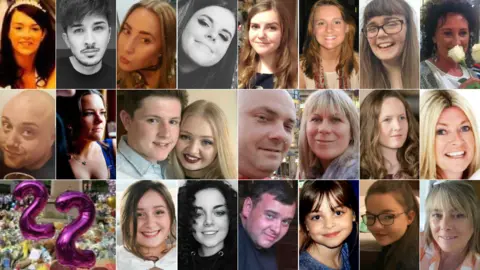Manchester Arena Inquiry: Paramedic 'wrong not to send team to bomb scene'
 Manchester Arena Inquiry
Manchester Arena InquiryA senior paramedic has told an inquiry he was wrong not to send three colleagues straight to the scene of the Manchester Arena bombing.
Simon Beswick arrived at the arena 40 minutes after the blast, which killed 22 people and injured hundreds more.
The inquiry has heard how only three paramedics treated casualties in the City Room, where the bomb exploded.
Three additional paramedics were held back to treat patients on the Victoria Station concourse outside the arena.
Twenty-two people were killed and hundreds more injured when Salman Abedi detonated a bomb at the end of an Ariana Grande concert on 22 May 2017.
Mr Beswick told the public inquiry into the attack that two of his North West Ambulance Service (NWAS) colleagues had gone into the City Room foyer while he and three other colleagues, who arrived later, remained outside to assist with casualties there.
"On reflection and with the benefit of hindsight, yes I believe I was incorrect in my decision making there and we could have moved forward," he said.
"But on the evening, the challenges we faced, I believe I was robust in my decision making not to overcommit members of the team and to allocate [them] to treat critically-ill patients at that point."
Mr Beswick, who was acting up as team leader of NWAS's Hazardous Area Response Team (HART), said making the decision had caused him a "great deal of disquiet and concern".
He said he had been informed the scene had not been declared safe at that stage and there was a concern over secondary devices or another terrorist attack.
 Family handouts
Family handoutsMr Beswick told the inquiry Dan Smith, a NWAS operational commander, had asked him to stay back and set up a casualty collection point on the station concourse while two paramedics were sent into the City Room to triage and treat patients.
When asked if he was surprised he was not sent to the scene, Mr Beswick said the "amount of patients was overwhelming and there was nowhere to treat them".
When three more members of the HART team arrived, they were asked to treat patients who were being carried out on makeshift stretchers, rather than go into the foyer, the inquiry heard.
At one stage Mr Beswick spent three minutes helping three casualties walk across the road outside the station, the hearing was told.
He accepted that a paramedic with his skills "could have been more effective moving forward" to help other patients.
 Manchester Arena Inquiry
Manchester Arena InquiryMr Beswick also told the inquiry he had to "play the role of a parking officer" at times because there was no traffic officer on the scene.
The inquiry also heard from HART paramedic Christopher Hargreaves, who said he was with Mr Beswick when a radio message came through at about 22.40 BST regarding an "ongoing bombing or shooting" at the arena.
He said: "It seemed a little bit chaotic trying to get some more information from control once we had set off."
He told the inquiry Mr Beswick looked on Twitter to try to gather more information, which he agreed was not ideal.
He said: "At the time it was our only option."
The inquiry continues.

Why not follow BBC North West on Facebook, Twitter and Instagram? You can also send story ideas to [email protected]
